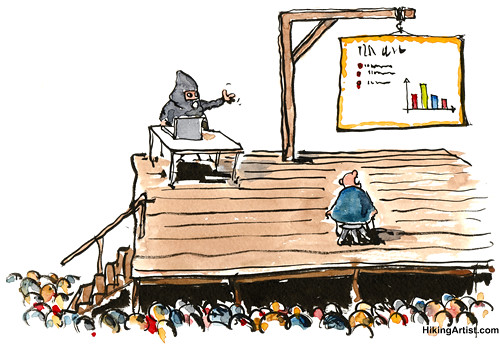Students who say, "just tell me what to memorise," and how to serve them
- Subscribe to RSS Feed
- Mark as New
- Mark as Read
- Bookmark
- Subscribe
- Printer Friendly Page
- Report Inappropriate Content
I love learning, *really* love learning: if I could avoid my classes and sneak into the back of colleagues' rooms to listen to lessons on classical civilisation, Russian grammar, and theoretical physics all day long, that would be heaven.
As it is, I am a teacher, but I don't want to be a teacher - never have. Plus I don't like people (children or adults - I'm an equal opportunity misanthrope) - staff room break times can be a bit awkward...
But, it turns out that I just know what I like. Remember Sally ordering her pie with ice cream on the side but strawberry instead of vanilla if they had it, ...?
I'm just the same, only not with pie (cooked fruit in pastry?!), but pedagogy and people - I know what I like and what I don't like: I don't like didactic methods and those who shy away from intellectual challenge.
If you want your learning to be a journey in which you really engage with the material, develop skill sets, and go outside your cognitive comfort zone, then you're my cup of tea.
And therein lies my recent problem.
Having discovered Canvas at Christmas, I excitedly made loads of content, showcased it to my students...and they were distinctly underwhelmed. Their chief complaints (and yes, they complained and made a protest survey declaring online learning 'inefficient') were that...
 1. They preferred me to stand at the front of the class to deliver content which they would then write down - chalk and talk - I said I wasn't prepared to teach like that and that I would be doing them a disservice if they left with a certificate in my subject (Economics) but without the skills that would allow them to succeed in higher education and an increasingly competitive, globalised labour market, i.e. digital/IT skills.
1. They preferred me to stand at the front of the class to deliver content which they would then write down - chalk and talk - I said I wasn't prepared to teach like that and that I would be doing them a disservice if they left with a certificate in my subject (Economics) but without the skills that would allow them to succeed in higher education and an increasingly competitive, globalised labour market, i.e. digital/IT skills.
2. They found the platform confusing - it transpires that they didn't bother to scroll to look for the blue 'submit assignment' button, so some decided to complete the work online then simply print it off and hand it in (defeating my 'save the trees' stance), and that some had *very* poor IT skills, e.g. didn't know how to refresh a webpage or search for specific phrases using quotation marks.
So, my attempt to blend learning and flip my classroom this year did not go well. I rushed it, students didn't understand why it was happening, there was no buy-in, and it wasted time - I had to reteach all the content.
Lessons learned...by me!
1. Do not assume that 21st century students with thumbs attached to smart phones are actually tech-savvy: I teach Yr10 (first year of GCSE, 14-15yrs old) and Yr12 (first year of A Level or BTEC or IB, 16-17yrs old) in a UK independent school (fee-paying, not run by the gov't) so there isn't poverty of access or opportunity, but there are no IT lessons anywhere in the curriculum after age 12, which is a problem to be tackled sometime never... My students are also 'disadvantaged' as they are very conformist - they expect chalk-and-talk simplicity and not being challenged with new ways of learning/thinking - they just want to memorise what they need to pass the exam...
2. If you're the only teacher using the platform they are much less invested in learning how to use the technology, and really engage with it, as they are not going to need it in nine months' time. But I worry that they are right - spending time learning a digital skill-set they won't need in the examination, in their other classes, and, maybe, not even their HE or career paths isn't efficient - with a ridiculously short academic year (Paying a shed load of cash for your education? Then we'll give you fewer days in the classroom - you're welcome!) I should just be shovelling the information into their brains and getting them ready to regurgitate it onto an examination script... but I *really* don't want to teach like that...
3. Explain the benefits of Canvas from the start and from their perspective: course materials, assignments, calendar, etc. are available anywhere with internet - no need to lug books home in the holidays, etc. They will need these skills in HE - and I have explained that ad nauseum - but the reply is depressingly repetitive - "I don't want to think about university now or the skills I need, I just want to learn the content that will get me the A* grade in the final examination." I honestly think these students may be some of the least intellectually adventurous people I've ever met!

4. Be clear on expectations of engagement - their grades will depend on this. I shouldn't have been cowed by the populist protest - I know they will benefit in the long run by using Canvas and I should have stuck to my convictions. Instead I gave up and switched back to standing at the front, showing them a PowerPoint, and telling them what to write down from it.
5. Patiently showcase Canvas and make room for the students who are reluctant - find a way to support and encourage. I had assumed that this new way of learning would be embraced quickly. If I had been given this opportunity, I would have grabbed it with both hands - 'the future is now!' sci-fi dreamscape of Inspector Gadget's Penny and her computer-book...but they just don't seem keen. I'm not good at empathising with those who do not have the same love affair with technology as I do: I just expect everyone to be as deliriously excited as I am about all the buttons and the possibilities and the everything!
Next steps
I am part of a team helping guide staff in the transition to being a BYOD school whilst we implement our 'digital strategy'. Staff don't understand why we're changing - it seems to be about photocopying less and, thus, saving money. Students don't understand why we're doing this either. Staff are reluctant to change teaching habits and my enthusiastic proselytising isn't helping. I guess the pressure on exam results to boost our position in the rankings and, thereby, get more customers squashes any desire to try something 'risky'.
I need to find a way to really sell it to them.
So, here I am trying to make sure that my new classes in September have a better experience. Does anyone have advice on what I should do differently this time, or other recommendations for improving student motivation?
You must be a registered user to add a comment. If you've already registered, sign in. Otherwise, register and sign in.
